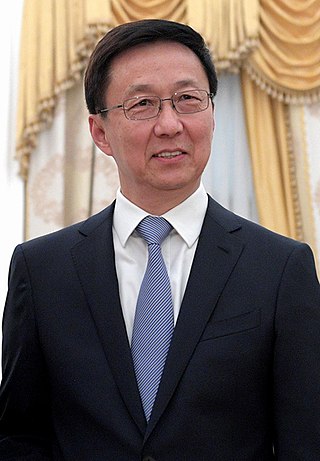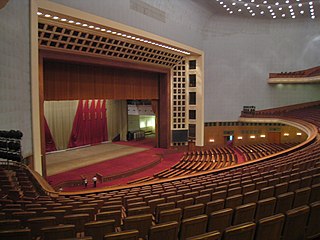Related Research Articles

The Politburo Standing Committee (PSC), officially the Standing Committee of the Political Bureau of the Central Committee of the Communist Party of China, is a committee consisting of the top leadership of the Chinese Communist Party (CCP). Historically it has been composed of five to eleven members, and currently has seven members. Its officially mandated purpose is to conduct policy discussions and make decisions on major issues when the Politburo, a larger decision-making body, is not in session. According to the party's constitution, the General Secretary of the Central Committee must also be a member of the Politburo Standing Committee.

Zeng Qinghong is a retired Chinese politician. He was a member of the Politburo Standing Committee of the Chinese Communist Party, China's highest leadership council, and First Secretary of the Secretariat of the Central Committee between 2002 and 2007. He also served as the Vice-President of the People's Republic of China from 2003 to 2008. During the 1990s, Zeng was a close ally of then-Party general secretary Jiang Zemin, and was instrumental in consolidating Jiang's power. For years, Zeng was the primary force behind the party's organization and personnel.
The Shanghai clique, also referred to as the Shanghai gang, Jiang clique, or Jiang faction, refers to an informal group of Chinese Communist Party (CCP) officials who rose to prominence under former CCP General Secretary Jiang Zemin while he served as the party chief and mayor of Shanghai.

The National Congress of the Chinese Communist Party is a party congress that is held every five years. The National Congress is theoretically the highest body within the Chinese Communist Party (CCP). Since 1987 the National Congress has been held in the months of October or November. The venue for the event, beginning in 1956, is the Great Hall of the People in Beijing. The Congress is the public venue for top-level leadership changes in the CCP and the formal event for changes to the Party's Constitution. In the past two decades the National Congress of the CCP has been pivotal at least as a symbolic part of leadership changes, and therefore has gained international media attention.

The 16th National Congress of the Chinese Communist Party was held in Beijing between November 8 and 14, 2002. It was preceded by the 15th National Congress and was succeeded by the 17th National Congress. 2,114 delegates and 40 specially invited delegates represented the party's estimated 66 million members.

Han Zheng is a Chinese politician serving as the current vice president of the People's Republic of China since 2023. He previously served as the first vice premier of the People's Republic of China between 2018 and 2023, and as a member of the Politburo Standing Committee of the Chinese Communist Party (CCP) between 2017 and 2022.

Hui Liangyu was a Vice Premier of the People's Republic of China in charge of agriculture.

The 17th National Congress of the Chinese Communist Party was held in Beijing, China, at the Great Hall of the People from 15 to 21 October 2007. Congress marked a significant shift in the political direction of the country as CCP General Secretary Hu Jintao solidified his position of leadership. Hu's signature policy doctrine, the Scientific Development Concept, which aimed to create a "Socialist Harmonious Society" through egalitarian wealth distribution and concern for the country's less well-off, was enshrined into the Party Constitution. It was succeeded by the 18th National Congress of the Chinese Communist Party.
The 15th Politburo of the Chinese Communist Party (CCP), formally the Political Bureau of the 15th Central Committee of the Communist Party of China, was elected at the 1st Plenary Session of the 15th Central Committee of the CCP on 19 September 1997 in the aftermath of the 15th National Congress. This electoral term was preceded by the 14th Politburo and succeeded by the 16th. Seven of the 22 members served in the 15th Politburo Standing Committee.
The 17th Politburo of the Chinese Communist Party (CCP), formally the Political Bureau of the 17th Central Committee of the Communist Party of China, was elected at the 1st Plenary Session of the 17th Central Committee of the CCP on 22 October 2007 in the aftermath of the 17th National Congress. This electoral term was preceded by the 16th Politburo and succeeded by the 18th. Of the 25 members, nine served in the 17th Politburo Standing Committee.
The 16th Central Committee of the Chinese Communist Party was in session from 2002 to 2007. It held seven plenary sessions. It was set in motion by the 16th National Congress of the Chinese Communist Party. The 15th Central Committee preceded it. It was followed by the 17th Central Committee of the Chinese Communist Party.
The 15th Central Committee of the Chinese Communist Party was in session from 1997 to 2002. The 14th Central Committee preceded it. It was followed by the 16th Central Committee of the Chinese Communist Party. This was the first Central Committee that current CCP general secretary Xi Jinping was elected to, as an alternative member.

Wang Chen is a Chinese journalist and retired politician who served as the first-ranked Vice Chairperson of the Standing Committee of the 13th National People's Congress. He was a member of the 19th Politburo of the Chinese Communist Party. He served as Director of State Council Information Office from 2008 to 2013 and as the Secretary-General of the 12th National People's Congress Standing Committee from 2013 to 2018.
The succession of power in China since 1949 takes place in the context of a one-party state under the Chinese Communist Party (CCP). Despite the guarantee of universal franchise in the constitution, the appointment of the Paramount leader lies largely in the hands of his predecessor and the powerful factions that control the Central Committee of the Chinese Communist Party.
The 18th Politburo of the Chinese Communist Party (CCP), formally the Political Bureau of the 18th Central Committee of the Communist Party of China, was elected at the 1st Plenary Session of the 18th Central Committee of the CCP on 15 November 2012 in the aftermath of the 18th National Congress. This electoral term was preceded by the 17th Politburo and succeeded by the 19th. Of the 25 members, seven served in the 18th Politburo Standing Committee.

The Central Leading Group on Hong Kong and Macau Affairs is an internal policy coordination group of the Central Committee of the Chinese Communist Party (CCP), reporting to the CCP Politburo, in charge of supervising and coordinating Beijing's policy towards the Special Administrative Regions of Hong Kong and Macau.

Xi Jinping has ruled the People's Republic of China (PRC) under his party and state administration since 2012. He succeeded Hu Jintao as General Secretary of the Chinese Communist Party in 2012, and later in 2016 was proclaimed the CCP's 4th leadership core, following Mao Zedong, Deng Xiaoping, and Jiang Zemin.
The 16th Politburo Standing Committee, formally the Standing Committee of the Political Bureau of the 16th Central Committee of the Communist Party of China, was elected by the 1st Plenary Session of the 16th Central Committee in 2002, in the aftermath of the 16th National Congress of the Chinese Communist Party (CCP). It was preceded by the CCP's 15th Politburo Standing Committee and was succeeded by the 17th in 2007.
The 16th Secretariat, formally the Secretariat of the 16th Central Committee of the Communist Party of China, was nominated by the 16th Politburo Standing Committee and approved by the 1st Plenary Session of the 16th Central Committee on 15 November 2002, in the aftermath of the 16th National Congress of the Chinese Communist Party (CCP). This electoral term was preceded by the 15th Secretariat and succeeded by the 17th in 2007.
The 15th Secretariat, formally the Secretariat of the 15th Central Committee of the Communist Party of China, was nominated by the 15th Politburo Standing Committee and approved by the 1st Plenary Session of the 15th Central Committee on 19 September 1997, in the aftermath of the 15th National Congress of the Chinese Communist Party (CCP). This electoral term was preceded by the 14th Secretariat and succeeded by the 16th in 2002.
References
- 1 2 "List of Politburo Members, Alternate Member". China Internet Information Center. 15 November 2002. Archived from the original on 1 August 2023. Retrieved 1 August 2023.
- ↑ "Cao Gangchuan". People's Daily . Archived from the original on 1 August 2023. Retrieved 1 August 2023.
- ↑ "Who's Who: Chen Liangyu". China Today . Archived from the original on 1 August 2023. Retrieved 1 August 2023.
Barboza, David (12 April 2008). "Former Party Boss in China Gets 18 Years". The New York Times . Archived from the original on 30 January 2013. Retrieved 1 August 2023. - ↑ "Guo Boxiong". People's Daily . Archived from the original on 31 July 2023. Retrieved 31 July 2023.
- ↑ "He Guoqiang". China Today . Archived from the original on 24 July 2023. Retrieved 24 July 2023.
- ↑ "Profile: Hu Jintao". BBC News. 14 March 2013. Archived from the original on 24 July 2023. Retrieved 24 July 2023.
- ↑ "Huang Ju". People's Daily . Archived from the original on 24 July 2023. Retrieved 24 July 2023.
- ↑ "Hui Liangyu". People's Daily . Archived from the original on 31 July 2023. Retrieved 31 July 2023.
- ↑ "Jia Qinglin". People's Daily . Archived from the original on 24 July 2023. Retrieved 24 July 2023.
- ↑ "Members of the Standing Committee of the Political Bureau of the 17th Central Committee of the Communist Party of China". Beijing Review . Archived from the original on 24 July 2023. Retrieved 23 July 2023.
- ↑ "Liu Qi". People's Daily . Archived from the original on 31 July 2023. Retrieved 31 July 2023.
- ↑ "Liu Yunshan 刘云山". China Vitae. Archived from the original on 22 July 2023. Retrieved 23 July 2023.
- ↑ "Luo Gan". People's Daily . Archived from the original on 24 July 2023. Retrieved 24 July 2023.
- ↑ "王乐泉" [Wang Lequan] (in Chinese). The Central People's Government of the People's Republic of China. 24 October 2007. Archived from the original on 31 July 2023. Retrieved 31 July 2023.
- ↑ "Wang Zhaoguo". People's Daily . Archived from the original on 31 July 2023. Retrieved 31 July 2023.
- ↑ "Wen Jiabao". People's Daily . Archived from the original on 24 July 2023. Retrieved 24 July 2023.
- ↑ "Wu Bangguo". National People's Congress. 14 March 2013. Archived from the original on 24 July 2023. Retrieved 24 July 2023.
- ↑ "Wu Guanzheng". China Internet Information Center. Archived from the original on 24 July 2023. Retrieved 24 July 2023.
- ↑ "Wu Yi". People's Daily . Archived from the original on 1 August 2023. Retrieved 1 August 2023.
- ↑ "Yu Zhengsheng 俞正声". China Vitae. Archived from the original on 22 July 2023. Retrieved 23 July 2023.
- ↑ "Zeng Peiyan". People's Daily . Archived from the original on 1 August 2023. Retrieved 1 August 2023.
- ↑ "Zeng Qinghong". China Internet Information Center. Archived from the original on 24 July 2023. Retrieved 24 July 2023.
- ↑ "Zhang Dejiang 张德江". China Vitae. Archived from the original on 22 July 2023. Retrieved 23 July 2023.
- ↑ "Zhang Lichang". People's Daily . Archived from the original on 1 August 2023. Retrieved 1 August 2023.
- ↑ Wu, Yuwen (12 October 2015). "Profile: China's fallen security chief Zhou Yongkang". BBC News. Archived from the original on 24 July 2023. Retrieved 24 July 2023.
- ↑ "Wang Gang". China Internet Information Center. Archived from the original on 31 July 2023. Retrieved 31 July 2023.